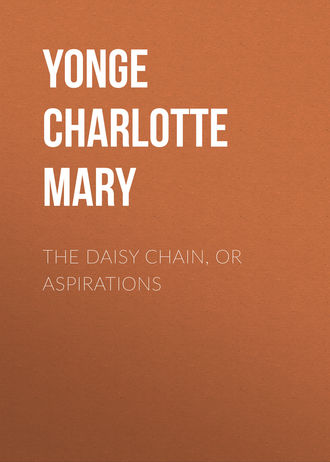 полная версия
полная версияThe Daisy Chain, or Aspirations
Norman and his wife went with her—the one grave but hopeful, the other trying to wile away the pain of parting, by her tearful mirth—making all sorts of odd promises and touching requests, between jest and earnest, and clinging to the last to her dear father-in-law, as if the separation from him were the hardest of all.
“Well, humming-birds must be let fly!” said he at last. “Ah! ha! Meta, are they of no use?”
“Stay till you hear!” said Meta archly—then turning back once more. “Oh! how I have thanked you, Ethel, for those first hints you gave me how to make my life real. If I had only sat still and wished, instead of trying what could be done as I was, how unhappy I should have been!”
“Come, take your sprite away, Norman, if you don’t want me to keep her for good! God bless you, my dear children! Good-bye! Who knows but when Doctor Tom sets up in my place, Ethel and I may come out and pay you a visit?”
It had all been over for some weeks, and the home-party had settled down again into what was likely to be their usual course, excepting in the holidays, to which the doctor looked forward with redoubled interest, as Tom was fast becoming a very agreeable and sensible companion; for his moodiness had been charmed away by Meta, and principle was teaching him true command of temper. He seemed to take his father as a special charge, bequeathed to him by Norman, and had already acquired that value and importance at home which comes of the laying aside of all self-importance.
It was a clear evening in March, full of promise of spring, and Ethel was standing in the church porch at Cocksmoor, after making some visits in the parish, waiting for Richard, while the bell was ringing for the Wednesday evening service, and the pearly tints of a cloudless sunset were fading into the western sky.
Ethel began to wonder where Norman might be looking at the sun dipping into the western sea, and thence arose before her the visions of her girlhood, when she had first dreamt of a church on Cocksmoor, and of Richard ministering before a willing congregation. So strange did the accomplishment seem, that she even touched the stone to assure herself of the reality; and therewith came intense thanksgiving that the work had been taken out of her hands, to be the more fully blessed and accomplished—that is, as far as the building went; as to the people, there was far more labour in store, and the same Hand must be looked to for the increase.
For herself, Ethel looked back and looked on. Norman Ogilvie’s marriage seemed to her to have fixed her lot in life, and what was that lot? Home and Cocksmoor had been her choice, and they were before her. Home! but her eyes had been opened to see that earthly homes may not endure, nor fill the heart. Her dear father might, indeed, claim her full-hearted devotion, but, to him, she was only one of many. Norman was no longer solely hers; and she had begun to understand that the unmarried woman must not seek undivided return of affection, and must not set her love, with exclusive eagerness, on aught below, but must be ready to cease in turn to be first with any. Ethel was truly a mother to the younger ones; but she faced the probability that they would find others to whom she would have the second place. To love each heartily, to do her utmost for each in turn, and to be grateful for their fondness, was her call; but never to count on their affection as her sole right and inalienable possession. She felt that this was the probable course, and that she might look to becoming comparatively solitary in the course of years—then tried to realise what her lonely life might be, but broke off smiling at herself, “What is that to me? What will it be when it is over? My course and aim are straight on, and He will direct my paths. I don’t know that I shall be alone, and I shall have the memory—the communion with them, if not their presence. Some one there must be to be loved and helped, and the poor for certain. Only I must have my treasure above, and when I think what is there, and of—Oh! that bliss of being perfectly able to praise—with no bad old self to mar the full joy of giving thanks, and blessing, and honour, and power! Need I dread a few short years?—and they have not begun yet—perhaps they won’t—Oh! here is actually papa coming home this way! how delightful! Papa, are you coming to church here?”
“Ay, Ethel. That weathercock of Spencer’s is a magnet, I believe! It draws me from all parts of the country to hear Richard in St. Andrew’s Church.









